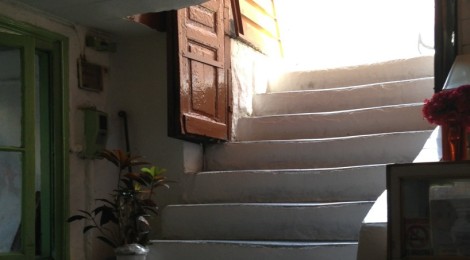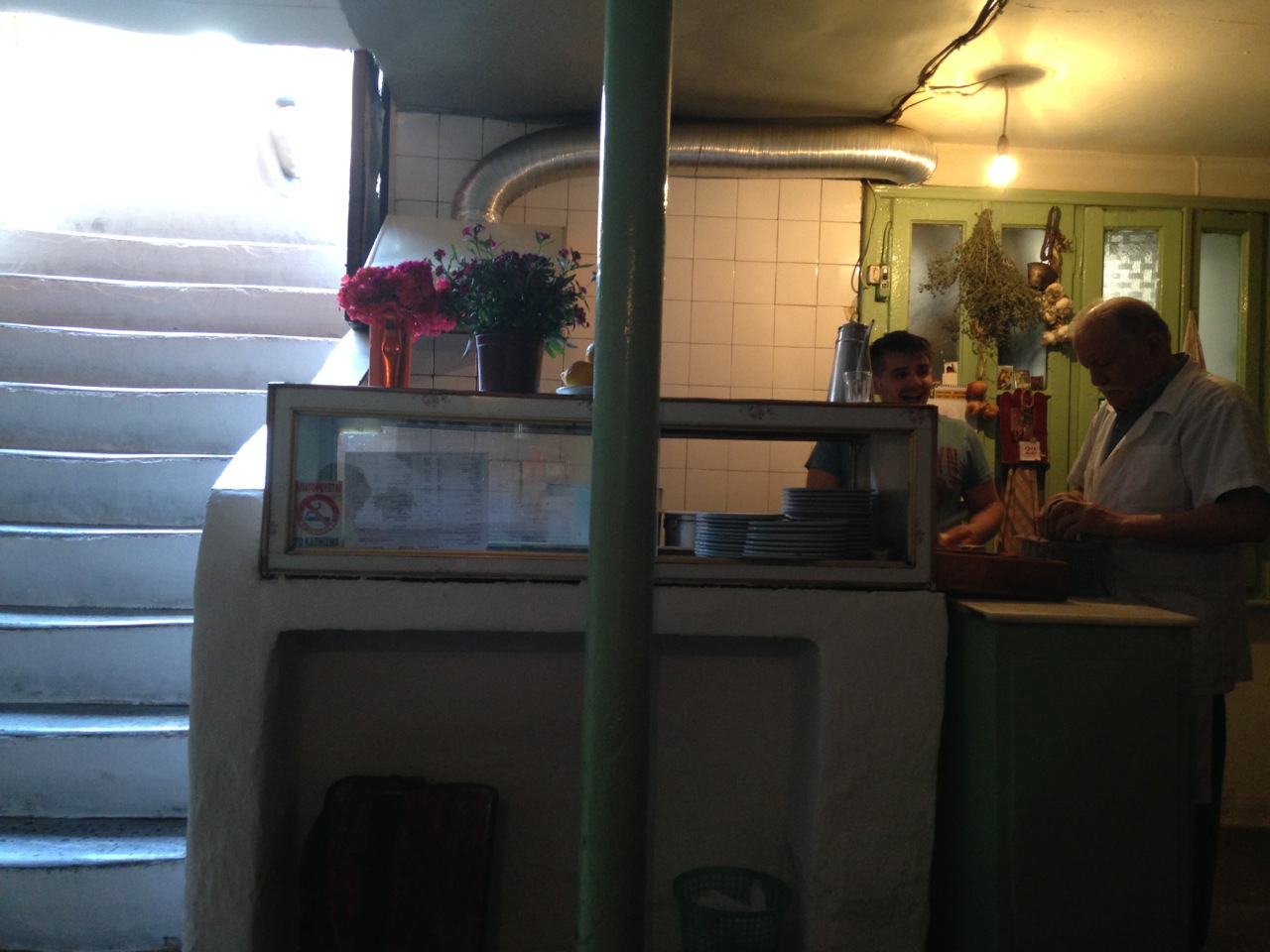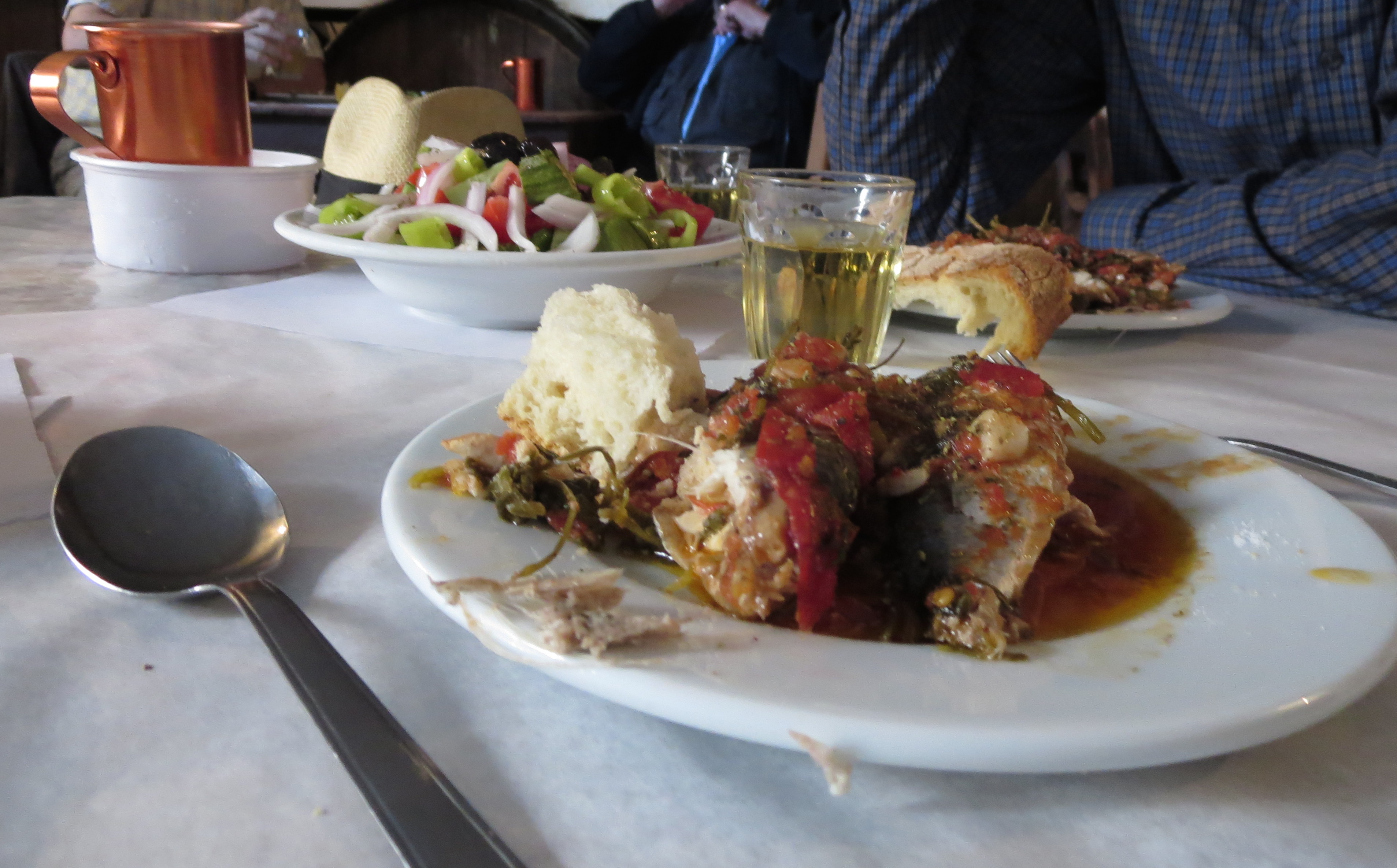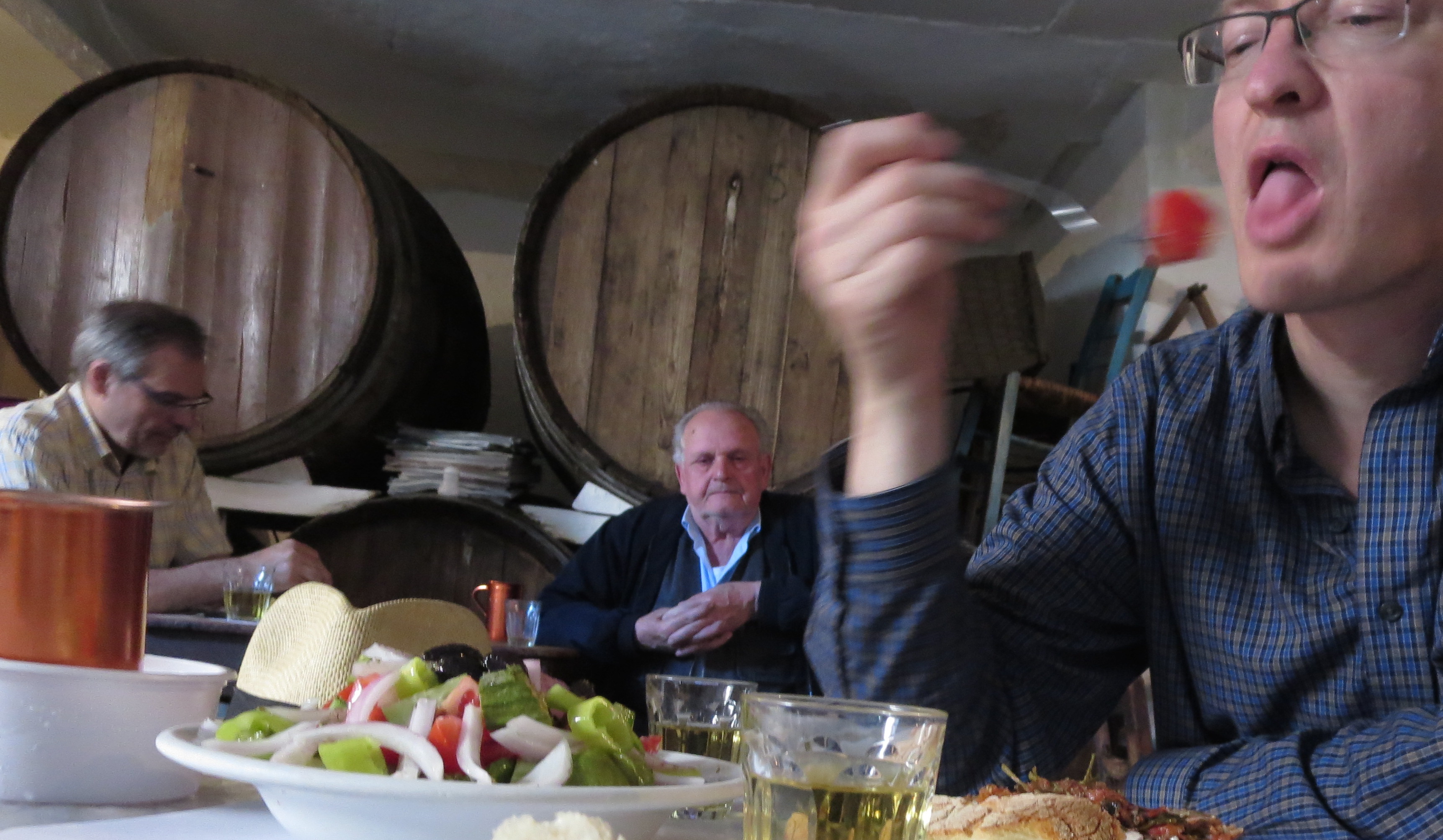
The Magic Greek Food Cave: Diporto Agoras
There is no sign. No conventional marking or advertising.
The hours are not posted. It is like Brigadoon in this way: part of the magic is knowing when to go.
Part of the magic is overcoming your trepidation.
Is it just ten steps down from brightest street side sunshine to the black shadow of the cave?
Go ahead…take the first two steps. The shadows retreat a little. Take more steps.
Adjust. See vast wine barrels against the back wall. Ten tables. Three empty. Take one.
Are they still serving? Rumor says they close at six. It is four-thirty in the afternoon.
A young Greek man–definitely the sorcerer’s apprentice–whips a large, fresh, paper napkin onto our table. In Greece this is a tablecloth. In a moment his is back with a dented, anodized aluminum pitcher and two water glasses. We pour and sniff. It isn’t water. White wine. It’s from the vast barrels that take up most of this taverna’s real estate.
A semicircle of bread appears on the table. Thick-crusted, white bread hastily cut half a dozen times.
If this is all that happens, it won’t be bad.
Old Greek man approaches. White hair, balding, apron.
“Food?” he asks. His English is blunt but effective. Nobody makes the mistake of assuming I’m Greek.
We nod, even if sometimes we consider the all-wine diet pure genius.
“Parakalo,” says Alison, who has been mining the phrasebook we bought yesterday for pleasantries and food words. “Please.”
He retreats with a raised eyebrow to a corner near the edge of one of the wine barrels. There are four burners and various pots. It is what passes for the kitchen. Or an alchemist’s laboratory.

The ‘kitchen’ at Diporto Agoras. The old man and alchemist, right, with his assistant, use their bare bulb to gently slice some cheese for a rowdy table behind us. The four burners are behind the glass. Check out the exhaust hood wired up with ducting from a clothes drier. That’s the entrance on the extreme left.
Soon we each have a plate with two fish, silvery bright, stuffed, and dressed with a thick tomato sauce that is nearly green with herbs. Taste.
Oregano, parsley, garlic, red pepper, tomato, and a few things we can’t name. The sauce is dizzyingly delicious. If it had come without fish, we’ve have spent a glorious half-hour scooping it up with the bread.
The fish are like small mackerel, but with a ridge of sharp spines down the back. They are rich in flavor and salted like the sea.
The old man is back. It feels like we’ve been savoring the flavors for a thousand years, but it is probably less than three minutes.
“Saláta?” Greek uses a word that is very close to ‘salad’ and means the same thing.
We nod, happy to be learning the magician’s tongue.
There is no flash, no puff of smoke, but the salad arrives mysteriously fast. The mystery is heighted in an open kitchen with four burners and two cutting boards. There appears to be nothing up his sleeve, no staging area.
The salad is quirky and quintessentially Greek, which we now know means a dice of the best things the cook can find—in our case that’s red onion, tomato, cucumber, green pepper, and lightly cooked okra—combined with feta and a small handful of olives, dressed with just a hint of olive oil. Taste.

A couple of fish, a loaf, a glass of wine, and a greek salad: these are the rewards of finding Diporto Agoras. Yes, the orange metal pitcher on the right is the wine carafe. The white plastic tub holds a cube of ice and a slash of water to keep the wine cool.
Our red onion is peppery, the green pepper sweet. Surprising. Interesting. The two are well combined by the cool cucumber. The okra changes the entire character of the dish, making what is a chop salad more sophisticated, more thoughtful. And we’ve been waiting all spring for tomatoes like this: laced with sunshine.
“Soup?” the old man asks. He’s back to the blunt instrument, English. Darn.
Excited to concentrate on our little fish and the surprising salad, we wave the soup away.
Later, watching other patrons who arrive even nearer to closing, we understand this is a mistake. The “soup” is a chickpea stew for which this place is famous. If we want it, we must return.
We waste not a rib of those little fish, not a slice of the salad, and not a crumb of the bread. We’ve garnered the attention of some older men sitting at the table closest to the ‘kitchen.’ Regulars? Owners?
Magically, two glasses of water—most welcome—appear on our table. We have no fear of Athens’s tap water. We drink it. Their interest is heightened.
“Itan nostimotato.” During the meal Alison has cribbed ‘that was delicious,’ onto the tablecloth from her phrasebook. The cook gives a little blush when she delivers the line. And one of the older guys wedged in at the wine barrel closest to the kitchen nearly laughs outright.

The consumer and the consumed. While I ungracefully scarf a tomato, the Greek gentleman observes our table manners and listens in as Alison practices her Greek. Those wine barrels are neither fake nor empty!
Alison is wickedly good at this game.
Is it from the blush? Is it standard practice? We’re not experienced enough to know:
With sleight of hand our dishes are whisked away and a small plate full of melon cubes appears on our table. Of the dozen or so pieces, four are skewered with toothpicks.
Magic indeed! Green and rich and sweet and cool, they seem almost too good to be real.
But real it is.
Rumors have it that Diporto Agoras is open from morning to early evening.
It’s just off the Athens central market at the corner of Theatrou street.
No sign, no marketing, just satisfied customers.
From another cave of delights,
Chris
Recent Comments